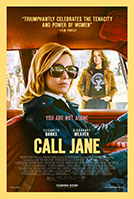Call Jane

| Original title: | Call Jane |
| Director: | Phyllis Nagy |
| Release: | Cinema |
| Running time: | 121 minutes |
| Release date: | 28 october 2022 |
| Rating: |
Mulder's Review
This year's opening film of the American Film Festival was the second film by director Phyllis Nagy (Mrs. Harris (2005)). A film that tackles head-on the issue of voluntary abortion and especially returns to a pivotal year in the United States, 1973, which marked the struggle of some women to be free to decide to have an abortion for valid reasons and this against an American system that saw as badly the emancipation of women in society as the legalization of this act that some consider against nature.
This film looks at the political and social aspect of abortion in the United States before the Supreme Court legalized the practice in a historic ruling in Roe v. Wade, 410 U.S. 113. This film is all the more important because this ruling was repealed on June 24, 2022 by the Supreme Court, leaving each state free to decide whether or not to implement it.
The film is both a tribute to this underground group of women activists who broke the national law and provided the necessary assistance to many women to have an abortion in exchange for a lump sum cash payment of approximately $600. The women were taken to a secret location blindfolded to keep the location confidential. The film also shows that at that time it was practically impossible to have a legal abortion and the only possibility was to obtain an amnesty from the hospital board and that only in the case of a therapeutic termination of pregnancy.
Often pregnant women at that time were forced to kill their embryos by falling down a flight of stairs or having some other accident. The screenplay by Hayley Schore and Roshan Sethi perfectly captures the important events of that time to give this film a strong realism. The historical reconstitution of this film allows us to be totally immersed in a film that inevitably leads to a debate on the position to be taken on abortion and to wonder if it would not be more judicious to analyze case by case whether this practice should be authorized or not in order to avoid abuses and a certain lack of reflection on the part of certain people.
This film succeeds in capturing the courage of the collective Jane's movement which knew how to listen to desperate women for whom abortion was the only possible solution in a period in which an unmarried woman with a child could not build a new life without the American society of the time looking on disapprovingly.
The director, in order to give an undeniable force to her film, was able to rely on an excellent female cast with Elizabeth Banks, Sigourney Weaver and Kate Mara in the important roles. She can thus make her film an essential work of this year on a theme that remains topical in an era where this act is still condemned in some countries. While the society of the 70s seemed to focus only on men and relayed to the homes or in less important positions women, this film aims constantly right and wants to bring the viewers to reflection. It took a real courage for the American studio to release such a film at this time, which risks to bring many anti-abortion movements in the United States, but also for the team of the film to carry a film as excellent as polemic with an undeniable talent.
Call Jane
Directed by Phyllis Nagy
Written by Hayley Schore, Roshan Sethi
Produced by Robbie Brenner, David Wulf, Kevin McKeon
Starring Elizabeth Banks, Sigourney Weaver, Chris Messina, Kate Mara, Wunmi Mosaku, Cory Michael Smith, Grace Edwards, John Magaro
Cinematography : Greta Zozula
Edited by Peter McNulty
Music by Isabella Summers
Production companies : Ingenious Media, RB Entertainment, Redline Entertainment, Our Turn Productions, FirstGen Content, LB Entertainment
Distributed by Roadside Attractions (United states)
Release dates January 21, 2022 (Sundance) : October 28, 2022 (United States)
Running time : 121 minutes
Seen on September 2, 2022 at the Deauville International Center
Mulder's Mark:

